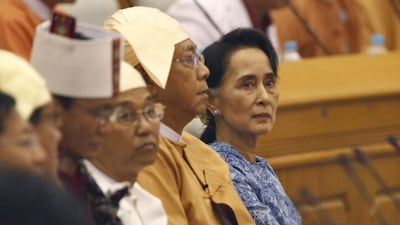The sight of Aung San Suu Kyi, once Myanmar’s most famous political prisoner, being sworn in as a minister in a new democratic government will have millions inside and outside the country celebrating.
Pictures of the new ministers, including the president, Htin Kyaw, a close ally of Ms Suu Kyi, taking the oath of office in the capital Naypyidaw were both inspirational and curiously prosaic. If this is how half a century of military rule ends, then it did so more with a whimper than a bang.
Now, of course, comes the hard work, and not merely for Ms Suu Kyi, who is taking on at least four portfolios: foreign minister, minister in the president’s office, minister for education and minister for energy. After decades in opposition, many of them under house arrest, Ms Suu Kyi is making up for lost time.
As she well needs to. The party she leads, the National League for Democracy (NLD), will have a difficult job asserting itself against the military, which has most assuredly not departed the political scene. They hold a quarter of parliamentary seats, effectively giving them a veto.
Corruption is widespread, the rule of law is weak and both the private sector and the judiciary are used to being pushed around by the military. Tackling any one of those issues will rapidly bring the NLD into conflict with the military.
There are also credibility issues for Ms Suu Kyi. In recent years, the plight of the Rohingya has come to the world’s attention – the Muslim minority is widely persecuted by the Buddhist majority, and more than 100,000 of them were displaced in 2012. Only recently was a brutal four-year curfew on the group lifted. Yet throughout all of this, Ms Suu Kyi has been silent – her critics say complicit – fearful of upsetting Buddhist public opinion, a decision that has affected her standing in Muslim and western capitals.
All of that will need to be tackled, and soon. From a party of protest, the NLD will have to rapidly become a party of government – one that governs for all of Myanmar, not merely some.

